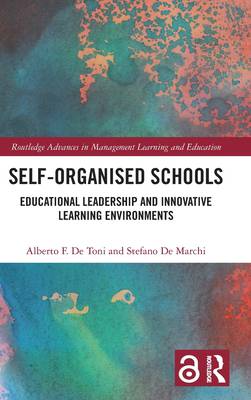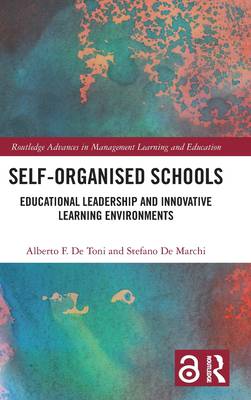
Je cadeautjes zeker op tijd in huis hebben voor de feestdagen? Kom langs in onze winkels en vind het perfecte geschenk!
- Afhalen na 1 uur in een winkel met voorraad
- Gratis thuislevering in België vanaf € 30
- Ruim aanbod met 7 miljoen producten
Je cadeautjes zeker op tijd in huis hebben voor de feestdagen? Kom langs in onze winkels en vind het perfecte geschenk!
- Afhalen na 1 uur in een winkel met voorraad
- Gratis thuislevering in België vanaf € 30
- Ruim aanbod met 7 miljoen producten
Zoeken
Self-Organised Schools
Educational Leadership and Innovative Learning Environments
Alberto F de Toni, Stefano de Marchi
€ 290,45
+ 580 punten
Omschrijving
Self-Organised Schools: Educational Leadership and Innovative Learning Environments describes the results of the research we carried out at fourteen Italian schools that highlight how there is a positive correlation between the capabilities of school self-organization and the innovativeness of learning environments: in other words, the more self-organized schools are, the more innovative learning environments are. The results of this work are part of the strand of research of bottom-up emergency and self-organization, an extremely fruitful trend as shown by Sugata Mitra, the founder of the Self-Organized Learning Environments, according to whom, education is a self-organized system where learning is an emerging phenomenon. This book gives new insights on self-organization studies, and most of all, to the idea that change - organizational and educational innovation - sparks from the bottom. This book is aimed specifically at school principals of all levels, scholastic reformers, educational scholars, organisation and management consultants who want to innovate learning and management of learning. These actors will benefit drawing useful examples from more than thirty different learning environments worldwide, fourteen examples of schools that self-organize, two frameworks - and two ready-to-use questionnaires - measuring the innovativeness of a learning environment, and the capability of a school to self-organize. Self-organization is the most fascinating future of innovative principals
Specificaties
Betrokkenen
- Auteur(s):
- Uitgeverij:
Inhoud
- Aantal bladzijden:
- 318
- Taal:
- Engels
- Reeks:
Eigenschappen
- Productcode (EAN):
- 9781032132341
- Verschijningsdatum:
- 29/08/2022
- Uitvoering:
- Hardcover
- Formaat:
- Genaaid
- Afmetingen:
- 152 mm x 229 mm
- Gewicht:
- 594 g

Alleen bij Standaard Boekhandel
+ 580 punten op je klantenkaart van Standaard Boekhandel
Beoordelingen
We publiceren alleen reviews die voldoen aan de voorwaarden voor reviews. Bekijk onze voorwaarden voor reviews.









